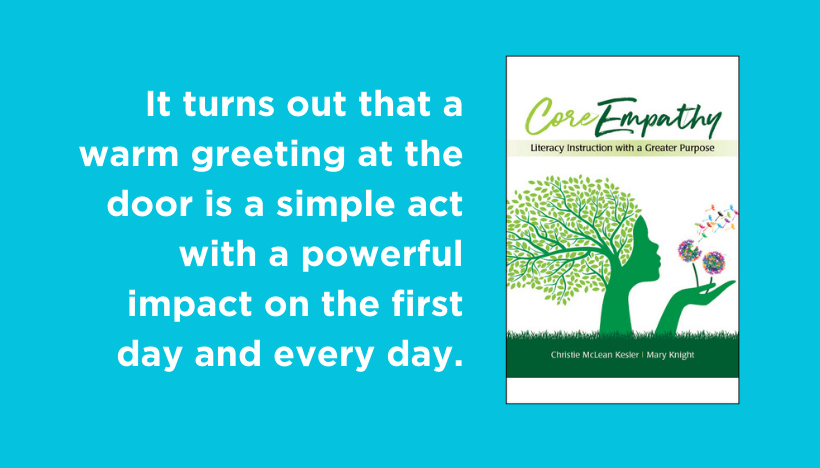This is an excerpt from Chapter 7, “The CoreEmpathy Classroom,” from CoreEmpathy: Literacy Instruction with a Greater Purpose (NCTE, 2021), by Christie McLean Kesler and Mary Knight.
Guiding Classroom Routines through an Empathy Lens
Greeting Your Students in the Morning
There’s no substitute for a teacher’s warm greeting for each student every morning as they walk in the door. This simple act sets the tone for the day, eases nerves, and gives everyone a moment to transition from their home life to school life. And this welcome is never more important than on the first day of school. It turns out that a warm greeting at the door is a simple act with a powerful impact on the first day and every day.
A 2018 study involving hundreds of classrooms revealed just how powerful this classroom practice can be. The study, reported in an article by Youki Terada (2018) on the Edutopia website, showed that a simple morning greeting contributed to students’ sense of connection and belonging, which in turn increased the time and effort they wanted to put into their learning. In fact, learning engagement went up by 20 percent and disruptive behavior decreased by 9 percent.
More learning, less disruptions—every teacher’s dream, right? Not surprisingly, the teachers themselves felt better about their day, too, when they initiated this welcoming practice, setting a positive tone for everyone (Terada, 2018).
Clearly, these first moments of the day carry an impact that only beginnings hold. We know a teacher who puts an empathy twist to this warm morning greeting. Sarah, a first-grade teacher in Bellingham, Washington, greets her students every morning at the door as she sits on one of their chairs. She models empathy by putting herself in the seat of her students, literally, so that she can greet each one at eye level as they cross the threshold.
Besides setting a positive tone for the day, Sarah also uses this welcoming time to gain valuable information about each student, she says. Utilizing the empathy skill of observing facial expressions and body language, she picks up clues about each child’s emotional state. “Their eyes and faces tell me how their morning has been and how they are feeling,” she explains. Some give her a high five, others a sideways hug, but they all get a smile and a warm greeting from her each morning.
Like Sarah, Laura has also committed herself to “being fully present” as she greets her first graders every morning. She gives this practice top priority, she says, even when mornings are busy with meetings, because she sees how the positivity that her welcome generates sets the tone for the entire day. “If a meeting runs late in the morning, I no longer feel badly about politely excusing myself to be that warm greeter every day. I have made it a priority. No exceptions.”
 Christie McLean Kesler is a literacy specialist and professional developer in the Pacific Northwest. She supports teachers in expanding and deepening their instructional practice through facilitating inservice, presenting, and coaching. In addition to authoring literacy training materials, she is currently a senior instructor at Western Washington University, where she has been teaching and mentoring preservice teachers for more than two decades. You can contact her at www.CoreEmpathy.com.
Christie McLean Kesler is a literacy specialist and professional developer in the Pacific Northwest. She supports teachers in expanding and deepening their instructional practice through facilitating inservice, presenting, and coaching. In addition to authoring literacy training materials, she is currently a senior instructor at Western Washington University, where she has been teaching and mentoring preservice teachers for more than two decades. You can contact her at www.CoreEmpathy.com.
 As an author of middle grade fiction, Mary Knight is a frequent presenter and writing workshop facilitator at schools and conferences around the country. Her novel Saving Wonder (2016) was the winner of the 2017 Green Earth Book Award (Children’s Fiction), a Parents’ Choice award, and was selected as a Notable Book for Social Studies by the Children’s Book Council. You can contact her at www.CoreEmpathy.com.
As an author of middle grade fiction, Mary Knight is a frequent presenter and writing workshop facilitator at schools and conferences around the country. Her novel Saving Wonder (2016) was the winner of the 2017 Green Earth Book Award (Children’s Fiction), a Parents’ Choice award, and was selected as a Notable Book for Social Studies by the Children’s Book Council. You can contact her at www.CoreEmpathy.com.
Visit the NCTE Store to learn more or order CoreEmpathy: Literacy Instruction with a Greater Purpose.
It is the policy of NCTE in all publications, including the Literacy & NCTE blog, to provide a forum for the open discussion of ideas concerning the content and the teaching of English and the language arts. Publicity accorded to any particular point of view does not imply endorsement by the Executive Committee, the Board of Directors, the staff, or the membership at large, except in announcements of policy, where such endorsement is clearly specified.

